Past Events
View the past events of the Student Fellows Program.
2022-2023
Book talk: The Collapse of Constitutional Remedies
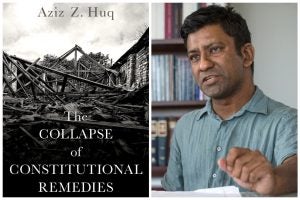
Professor Aziz Huq, Chicago law
Tuesday, September 20
12:30 pm | McDonough 164
Introduction by Professor Shon Hopwood
An exploration of how and why the Constitution’s plan for independent courts has failed to protect individuals’ constitutional rights, while advancing regressive and reactionary barriers to progressive regulation.
The Unqualified Impunity of Qualified Immunity
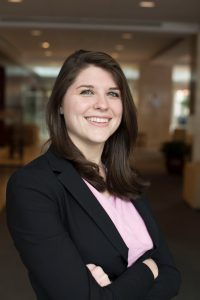 Alexa Gervasi, Executive Director of the Center
Alexa Gervasi, Executive Director of the Center
Tuesday, September 27
12:30 pm | McDonough 164
An introduction to the judge-made qualified and absolute immunity doctrines that shield government officials from accountability for constitutional violations. This program will explore what these doctrines are, why they exist, and how they undermine constitutional protections through modern case examples.
Technology, Listeners, and the First Amendment
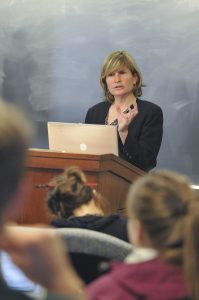
(Photo by Casey A. Cass/University of Colorado)
Professor Helen Norton, Colorado Law School
Co-sponsored by the Institute for Technology Law and Policy
Tuesday, October 4th
12:30 pm | McDonough 200
Introduction by Professor Paul Ohm
Empowered by the ability to collect and aggregate information about users and then to tailor messages designed to shape those users’ responses, today’s digital technologies can facilitate manipulation unprecedented in its reach and success. Differences in power and information matter to First Amendment law, permitting the government’s interventions to protect vulnerable listeners. The First Amendment permits the government to intervene to protect listeners from speakers’ manipulative efforts in certain settings.
Commission on Unalienable Rights
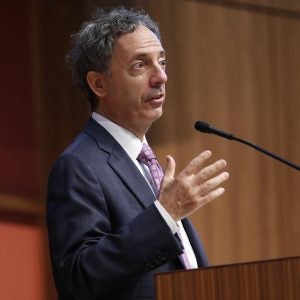
Photo by Eric Draper
Peter Berkowitz, Hoover Institution at Stanford University
Wednesday, October 26th
4:30 pm | McDonough 201
In the summer of 2019, Secretary of State Mike Pompeo provoked controversy when he announced the formation of the Commission on Unalienable Rights. The purpose of the independent commission was to provide advice on human rights in American foreign policy in light of America’s founding principles, constitutional traditions, and the obligations the nation took on in 1948 when the United States voted in the UN General Assembly in favor of Universal Declaration of Human Rights. Peter Berkowitz, who served as director of the State Department’s Policy Planning Staff and the commission’s executive secretary, will discuss the controversy over the commission, the report’s principal arguments, and its larger significance.
Democratic Justice Felix Frankfurter, the Supreme Court, and the Making of the Liberal Establishment
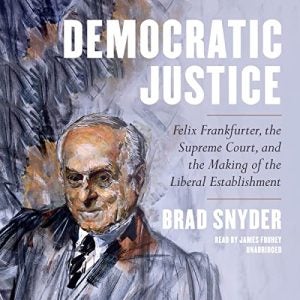
Professor Brad Snyder, Georgetown Law
Wednesday, November 2nd
12:00 pm | McDonough 202
In this sweeping narrative, Brad Snyder offers a full and fascinating portrait of the remarkable life and legacy of a long misunderstood American figure. This is the biography of an Austrian Jewish immigrant who arrived in the United States at age eleven speaking not a word of English, who by age twenty- six befriended former president Theodore Roosevelt, and who by age fifty was one of Franklin Roosevelt’s most trusted advisers. It is the story of a man devoted to democratic ideals, a natural orator and often overbearing justice, whose passion allowed him to amass highly influential friends and helped create the liberal establishment.
Nondelegation or No Divesting
Professor Philip Hamburger, Columbia Law
Professor David Hyman, Georgetown law
Tuesday, November 8th
1:00 pm | McDonough 156
Government by executive “diktat” is lately increasing. Many of these executive actions appear to have dubious—if any—statutory authority, but the courts have been reticent to validate objections along these lines. The U.S. Supreme Court has indicated a willingness to revisit and possibly to reinvigorate the non-delegation doctrine, or at least to put some teeth into its supposedly constraining intelligibility principle. The Court first will have to grapple with whether Article I, Section 1 of the Constitution contains a non-delegation principle at all?
Dobbs and Bruen: History, Tradition, and Originalism in the Supreme Court
Professor Marc O. DeGirolami, St. John’s Law
Professor Lawrence B. Solum, Virginia Law
Professor Randy E. Barnett, Georgetown Law
Tuesday, November 15th
12:30 pm | McDonough 200
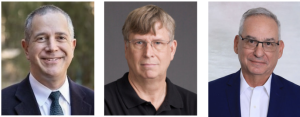 History and tradition played an important role in two of the most significant constitutional decisions from this past June. In Dobbs v. Jackson Women’s Health Organization, Justice Alito’s opinion for the Court relied on tradition and history as the basis for overruling Roe v. Wade. In New York State Rifle & Pistol Association v. Bruen, Justice Thomas’s opinion for the Court used tradition and history to define the scope of the right to bear arms. DeGirolami, Solum, and Barnett will discuss the role of originalism, tradition, and history in Dobbs and Bruen.
History and tradition played an important role in two of the most significant constitutional decisions from this past June. In Dobbs v. Jackson Women’s Health Organization, Justice Alito’s opinion for the Court relied on tradition and history as the basis for overruling Roe v. Wade. In New York State Rifle & Pistol Association v. Bruen, Justice Thomas’s opinion for the Court used tradition and history to define the scope of the right to bear arms. DeGirolami, Solum, and Barnett will discuss the role of originalism, tradition, and history in Dobbs and Bruen.
2021-2022
A Glorious Liberty: Frederick Douglass and the Fight for an Antislavery Constitution
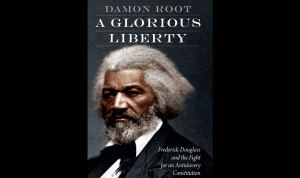
Thursday September 30 | 12:15 PM EST | McDonough 110
Damon Root
In this timely and provocative book, Damon Root reveals how Frederick Douglass’s fight for an antislavery Constitution helped to shape the course of American history in the nineteenth century and beyond. At a time when the principles of the Constitution and Declaration of Independence were under assault, Frederick Douglass picked up their banner, championing inalienable rights for all, regardless of race. When Americans were killing each other on the battlefield, Douglass fought for a cause greater than the mere preservation of the Union. “No war but an Abolition war,” he maintained. “No peace but an Abolition peace.” In the aftermath of the Civil War, when state and local governments were violating the rights of the recently emancipated, Douglass preached the importance of “the ballot-box, the jury-box, and the cartridge-box” in the struggle against Jim Crow
The Administrative State and the Founders’ Vision of Constitutional Administration
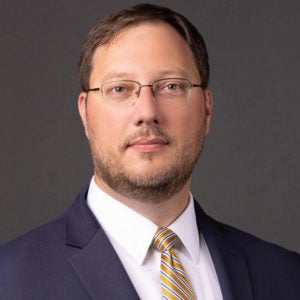 Wednesday October 27 | 11:45 AM EST | McDonough 201
Wednesday October 27 | 11:45 AM EST | McDonough 201
Adam White
Join Adam J. White, Co-Executive Director of the C. Boyden Gray Center for the Study of the Administrative State and a Senior Fellow at the American Enterprise Institute for a discussion on “The Administrative State and the Founders’ Vision of Constitutional Administration.”
Book Launch: The Original Meaning of the Fourteenth Amendment: Its Letter and Spirit
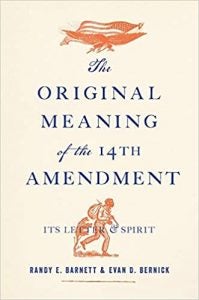 Tuesday November 2 | 12:15 PM EST | McDonough 110
Tuesday November 2 | 12:15 PM EST | McDonough 110
Professor Randy Barnett, Georgetown Law
C0-Sponsored by the Federalist Society
Adopted in 1868, the Fourteenth Amendment profoundly changed the Constitution, giving the federal judiciary and Congress new powers to protect the fundamental rights of individuals from being violated by the states. Yet, according to Randy Barnett and Evan Bernick, the Supreme Court has long misunderstood or ignored the original meaning of the amendment’s key clauses, covering the privileges and immunities of citizenship, due process of law, and the equal protection of the laws. Barnett and Bernick contend that the Fourteenth Amendment was the culmination of decades of debates about the meaning of the antebellum Constitution. Antislavery advocates advanced arguments informed by natural rights, the Declaration of Independence, and the common law. They also utilized what is today called public-meaning originalism. Although their arguments lost in the courts, the Republican Party was formed to advance an antislavery political agenda, eventually bringing about abolition. Then, when abolition alone proved insufficient to thwart Southern repression and provide for civil equality, the Fourteenth Amendment was enacted. It went beyond abolition to enshrine in the Constitution the concept of Republican citizenship and granted Congress power to protect fundamental rights and ensure equality before the law. Finally, Congress used its powers to pass Reconstruction-era civil rights laws that tell us much about the original scope of the amendment.
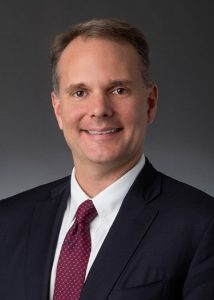 Monday November 15 | 3:00 PM EST | McDonough 200
Monday November 15 | 3:00 PM EST | McDonough 200
Derek Webb, Sidley Austin (GULC Alum)
Join Georgetown Law alumni Derek Webb for a discussion of his forthcoming book on the Antifederalists in McDonough 200. Lunch will be provided.
Mr. Webb is an associate in the Supreme Court and Appellate and Commercial Litigation and Disputes practice groups at Sidley. Previously, he was a fellow in Stanford Law School’s Constitutional Law Center where he taught a seminar called “Reading the Constitution” and successfully assisted with litigation on behalf of California raisin growers that reached the Supreme Court in Horne v. Department of Agriculture, 133 S. Ct. 2053 (2013).
2020-2021
The Misunderstood Eleventh Amendment
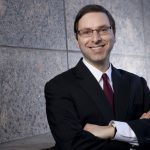
Wednesday November 18 | 3:00 PM EST
Professor Stephen Sachs, Duke Law
The Eleventh Amendment might be the most misunderstood amendment to the Constitution. Both its friends and enemies have treated the Amendment’s written text, and the unwritten doctrines of state sovereign immunity, as one and the same — whether by reading broad principles into its precise words, or by treating the written Amendment as merely an illustration of unwritten doctrines. The result is a bewildering forest of case law, which takes neither the words nor the doctrines seriously. The truth is simpler: the Eleventh Amendment means what it says. It strips the federal government of judicial power over suits brought against states, in law or equity, by diverse plaintiffs. It denies subject-matter jurisdiction in all such cases, to federal claims as well as state ones, and in only such cases. It cannot be waived. It cannot be abrogated. It applies on appeal. It means what it says. Likewise, the Amendment does not mean what it does not say: it neither abridges nor enlarges other, similar rules of sovereign immunity, derived from the common law and the law of nations, that limit the federal courts’ personal jurisdiction over unconsenting states.
Who Are ‘Officers of the United States’
 Friday November 6th | 12:00 PM EST
Friday November 6th | 12:00 PM EST
Professor Jennifer Mascott, George Mason Law
For decades courts have believed that only officials with “significant authority” are “Officers of the United States” subject to the Constitution’s Article II Appointments Clause requirements. But this standard has proved difficult to apply to major categories of officials. This Article examines whether “significant authority” is even the proper standard, at least as that standard has been applied in modern practice. To uncover whether the modern understanding of the term “officer” is consistent with the term’s original public meaning, this Article uses two distinctive tools: (i) corpus linguistics-style analysis of Founding-era documents and (ii) examination of appointment practices during the First Congress following constitutional ratification. Both suggest that the original public meaning of “officer” is much broader than modern doctrine assumes—encompassing any government official with responsibility for an ongoing governmental duty. This historic meaning of “officer” would likely extend to thousands of officials not currently appointed as Article II officers, such as tax collectors, disaster relief officials, customs officials, and administrative judges. This conclusion might at first seem destructive to the civil service structure because it would involve redesignating these officials as Article II officers—not employees outside the scope of Article II’s requirements. But this Article suggests that core components of the current federal hiring system might fairly readily be brought into compliance with Article II by amending who exercises final approval to rank and hire candidates. These feasible but significant changes would restore a critical mechanism for democratic accountability and transparency inherent in the Appointments Clause.
Judicial Deference: How Do I Defer to Thee? Let Me Count the Ways
 Wednesday October 28th | 3:00 PM EST
Wednesday October 28th | 3:00 PM EST
Mark Chenoweth, New Civil Liberties Alliance
Mark Chenoweth of the New Civil Liberties Alliance will discuss the topic of Judicial Deference using NCLA cases to provide examples of the different varieties.
Framing the Constitution: The Impact of Labels on Constitutional Interpretation
 Friday October 16th | 12:00 PM EST
Friday October 16th | 12:00 PM EST
Professor Donald Kochan, George Mason Law
In his forthcoming book, Framing the Constitution: The Impact of Labels on Constitutional Interpretation (Cambridge University Press, 2020), the Center’s Visiting Scholar Donald Kochan applies interdisciplinary social science research to constitutional labels. His research examines whether the choice of labeling text in the Constitution affects a receptor’s perception. In other words, because language matters—and first impressions do too—a person’s first interaction with a constitutional label matters. Extra-textual labels, a shorthand affixed to a specific right, power or other concept in the Constitution, according to Kochan, may impact how a person interprets the purpose and meaning of the Constitution’s text to which that label attaches. Kochan says his book aims to “make people more sensitive to label choices” and apply “more consideration in decisions to adopt or use labels.
Originalism’s Promise: A Natural Law Account of the American Constitution
 Wednesday October 14th | 3:00 PM EST
Wednesday October 14th | 3:00 PM EST
Professor Lee Strang, Toledo Law
The foundation of the American legal system and democratic culture is its longstanding written Constitution. However, a contentious debate now exists between originalists, who employ the Constitution’s original meaning, and Nonoriginalists, who argue for a living constitution interpretation. The first natural law justification for an originalist interpretation of the American Constitution, Originalism’s Promise presents an innovative foundation for originalism and a novel description of its character. The book provides a deep, rich, and practical explanation of originalism, including the mostdetailed originalist theory of precedent in the literature. Of interest to judges, scholars, and lawyers, it will help all Americans better understand their own Constitution and shows why their reverence for it, its Framers, and its legal system, is supported by sound reasons. Originalism’s Promise is a powerful contribution to the most important theory in constitutional interpretation.
Diverse Originalism
 Wednesday September 30th | 3:00 PM EST
Wednesday September 30th | 3:00 PM EST
Professor Christina Mulligan, Brooklyn Law
Originalism has a difficult relationship with race and gender. People of color and white women were largely absent from the process of drafting and ratifying the Constitution. Today, self-described originalists are overwhelmingly white men. In light of these realities, can originalism solve its “race and gender” problems while continuing to be originalist? This Article argues that originalists can take several actions today to address originalism’s race and gender problems, including debiasing present-day interpretation, looking to historical sources authored by people of color and white women, and severing
originalism and the Constitution’s text from their historical associations with racism and sexism. Taking these steps will not only make originalism more inclusive, but also help originalists become better at accessing the original meaning of the Constitution.
Decryption Originalism: The Lessons of Burr
 Friday September 25th | 2:00 PM EST
Friday September 25th | 2:00 PM EST
Professor Orin Kerr, Berkeley Law
The Supreme Court is likely to rule soon on how the Fifth Amendment privilege against self-incrimination applies to compelled decryption of a digital device. During the 1807 treason trial of Aaron Burr, with Chief Justice John Marshall presiding, the government asked Burr’s private secretary if he knew the cipher to an encrypted letter Burr had sent to a co-conspirator. Burr’s secretary pled the Fifth, leading to an extensive debate on the meaning of the privilege and an opinion from the Chief Justice. The Burr dispute presents a remarkable opportunity to unearth the original understanding of the Fifth Amendment and its application to surprisingly modern facts.
Supreme Disorder: Judicial Nominations and the Politics of America’s Highest Court
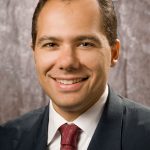 Wednesday September 23rd | 3:00 PM EST
Wednesday September 23rd | 3:00 PM EST
Ilya Shapiro, CATO Institute
Ilya Shapiro, director of the Cato Institute’s Center for Constitutional Studies, takes readers inside the unknown history of fiercely partisan judicial nominations and explores reform proposals that could return the Supreme Court to its proper constitutional role. Confirmation battles over justices will only become more toxic and unhinged as long as the Court continues to ratify the excesses of the other two branches of government and the parties that control them. Only when the Court begins to rebalance constitutional order, curb administrative overreach, and return power back to the states will the bitter partisan war to control the judiciary finally end.
The Historical Origins of Judicial Religious Exemptions
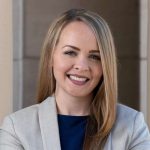
Friday September 4th | 3:00 PM EST
Professor Stephanie Barclay, Notre Dame Law
The Supreme Court has recently expressed a renewed interest in the question of when the Free Exercise Clause requires exemptions from generally applicable laws. Conventional wisdom holds that judicially created exemptions would have been a new or extraordinary means of protecting religious exercise. This Article, however, questions that assumption. Though the judiciary did not always use modern language of exemptions, this was functionally what judges were doing on a large scale throughout the country and
across a host of personal rights. The mode of analysis courts used to create these equitable exemptions also provides an important historical antecedent for modern strict scrutiny analysis
2019-2020
Exclusive Book Preview
Tuesday, September 17, 2019 | 12 PM – 1:30 PM
Join leading Constitutional Law experts Professor Randy Barnett and Professor Josh Blackman as they discuss their new book, An Introduction to Constitutional Law: 100 Supreme Court Cases Everyone Should Know.
Surprising Originalism
Tuesday, October 8, 2019 |12 PM – 1:30 PM
Join Constitutional Legal Theorist Larry Solum (GULC) for a discussion on the theory of originalism. His series of articles on constitutional originalism have shaped contemporary thinking about the great debate between originalism and constitutional theory.
Exclusive Book Preview
Tuesday, October 22, 2019 |12 PM – 1:30 PM
Join Professor Cashin, Carmack Waterhouse Professor of Law, Civil Rights and Social Justice as she discusses her new book, From Slavery to Jim Crow to Dark Ghettos: A Case for Reparation.
Coming to Originalism
Wednesday, November 6, 2019 | 3:30 PM – 4:30 PM
In this talk, Professor Erica Goldberg (Dayton) chronicles how she came to originalism and how historical methods of understanding the First Amendment yield surprising and important results. Her work-in-progress argues that common law baselines should be accounted for in our interpretation of “the freedom of speech.” Incorporating common law baselines into free speech jurisprudence better aligns our current doctrine with the original meaning of “the freedom of speech,” even though most believe free speech jurisprudence has strayed far from the original intentions of the drafters of the First Amendment. Normatively, this incorporation of common law baselines will lend greater clarity and neutrality to First Amendment jurisprudence and will help judges understand which harms should be accounted for in free speech doctrine.
Movie Screening: Clarence Thomas in His Own Words
Wednesday, February 26, 2020 | 7 PM – 10 PM
The Center is sponsoring a free screening of the documentary Created Equal: Clarence Thomas in His Own Words at the Georgetown AMC. Ticket reservation required in advance.
